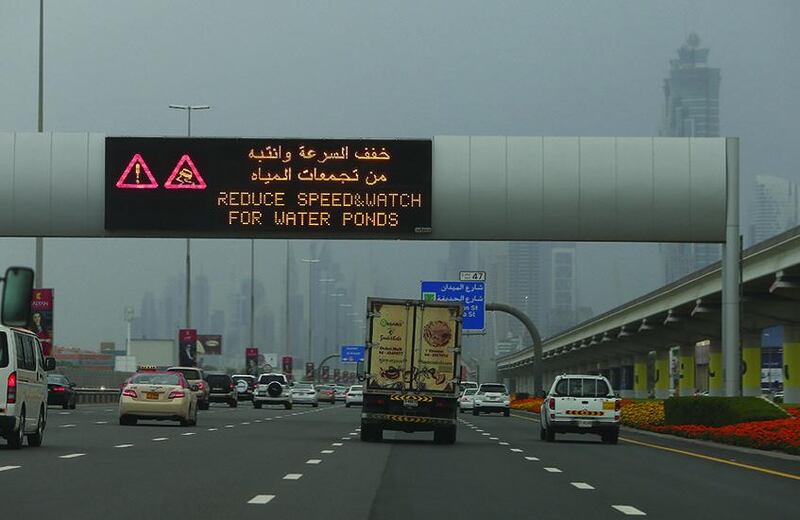On Tuesday this week, The National reported – as part of a larger feature about adverse driving conditions – that a car had overturned on Sheikh Zayed Road in Dubai, near Media City. Just a minute after it happened, I passed the mayhem and enormous tailbacks as I was returning a demonstrator car to its keeper. And, despite the suggestion that the rain was a contributing factor to the accident, I am still staggered that a car of its size (looked like an Audi Q7 to me) could end up on its roof on what’s basically a slip road. I mean, just how fast do you need to be driving for that to happen, no matter what car you’re in?
We are surrounded by lunacy on the UAE’s roads and Motoring has a sort of self-imposed ban on talking about it because, frankly, it’s been done to death. We all know what’s right and what’s wrong when it comes to road etiquette, surely. So I’m going to refrain from harping on about the appalling standards we all see every single day and look at what we should all be doing to ensure safe passage during our winter months.
Many of us come from countries where the winters are extremely harsh. Sub-zero temperatures, driving rain and gale-force winds are the norm for many Europeans, Americans and Canadians and, to be honest, we have it extremely easy here. But rain and high winds do occur and that’s when many accidents happen.
Most of our roads are equipped with absolutely no drainage, so there’s nowhere for rainwater to go. This can result in large areas of standing water and, when cars hit the wet stuff at speed, there is simply nothing for the tyres to grip. The effect is called “aquaplaning” and you might as well be driving on sheet ice. So the advice is simple: keep your speed down and your concentration levels up.
The UK’s Institute of Advanced Motorists (IAM) advises that, as a rule of thumb, whenever you need to use your wipers you should also turn on your dipped headlamps, and before overtaking put your wipers on their fastest setting.
“Keep your eyes on the road ahead,” it says, “and plan your driving so that you can brake, accelerate and steer smoothly – harsh manoeuvres will unbalance the car. Slow down. In the rain stopping distance is at least doubled. Giving yourself more space also helps to avoid spray, especially when following a large vehicle. If you have cruise control, avoid using it on wet roads – you need to pay more attention to the road surface conditions and alter your speed gently.”
It’s this smoothness of inputs that’s of paramount importance, whether you’re driving to the office in torrential rain or racing on a track at Yas Marina. Sudden movements and harsh braking don’t do you, your car or your fellow road users any good whatsoever.
Wind here can also be an issue and it’s usually strong gusts that catch motorists unaware. Again, the IAM offers some useful advice: “Strong winds can unsettle your car and even change your direction of travel. Grip your steering wheel firmly and also be ready for the effects of the wind on other road users, particularly motorcyclists and flat-sided vehicles like lorries.
“Overtaking high-sided vehicles,” it continues, “or driving past buildings can result in a sudden gust from the side as you clear. Give cyclists, motorcyclists, lorries and buses more room than usual. Side winds blow them around easily. Even pedestrians can be blown about. Go slow enough to cope with the gusts – wind can get under a car and reduce its handling and braking significantly. Keep an eye on what is happening to other vehicles – where they are affected will give you a pre-warning.”
Of course we all know this stuff and most of it is just common sense. Somehow, though, that goes out the window as soon as many of us get behind the wheel. While the weather is unsettled we all must remain extra vigilant. We live in hope that one day our roads will be among the safest in the world, rather than the most deadly.
[ khackett@thenational.ae ]
Follow us @LifeNationalUAE
Follow us on Facebook for discussions, entertainment, reviews, wellness and news.






